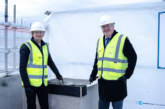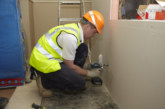Batteries from yesterday’s electric vans will help power the EVs of tomorrow in a pioneering new project in the North-East.
North Tyneside Council is revitalising its Killingworth Site depot, in a multi-million-pound project supported by the European Regional Development Fund (ERDF). A core aim of this initiative is to future-proof the site for sustainability and energy efficiency. The depot — which is home to around 1,000 council staff and partners — now includes a solar PV array and car ports delivering 700 kilowatts at peak generating around 600,00kW/h of electricity per annum. There are also more than 40 electric vehicle (EV) chargers being installed in the coming months, which will increase as the authority transitions a significant part of its fleet to EV over the next few years.
The Council realised it would be giving 15% of the solar energy it generated back to the grid, as it had no way of storing the excess energy created during daylight hours — and this electricity could be used to charge its electric vans at night. The authority turned to Connected Energy in nearby Newcastle for a solution.
Connected Energy has developed a unique battery energy storage system (BESS), which is already used to support solar storage and EV charging across the UK and Europe. Its pioneering E-STOR system uses batteries from end-of-life electric vans, giving them a second life in BESS. Typically, the batteries still have up to 80% of their original energy storage capacity at the end of the vehicle’s life, making them ideal for this application. Furthermore, Connected Energy’s intelligent management system enables E-STOR to integrate with solar PV, the grid, and other smart technology like building management systems. This means E-STOR can balance a site’s energy needs, reduce energy bills, and make the most of on-site renewables.
Ian Lillie, Strategic Facilities Manager for North Tyneside Council, with responsibility for the depot, said: “Since installing and commissioning the PV array in February 2023 we have already generated over 100,000kW of green energy. However, we’ve had to give back over 20,000kW to the grid because we can’t store it.
“By using Connected Energy’s battery energy storage system, we can capture that energy and use it to charge our electric vans and indeed the buildings on site overnight. And in the winter, we can use E-STOR to store energy from the grid on lower tariffs at night, to use during the day. The combination of solar and BESS should significantly reduce our electricity bills while also cutting carbon emissions from our energy consumption.”

The council has added a raft of energy efficiency measures to the refurbished buildings on the Killingworth Site, including a heat recovery system, more efficient boilers, LED lighting and a building energy management system. “We have smart sub-metering capabilities to support energy efficiency, but battery energy storage takes this to another level,” Ian added. “It effectively acts as the brain of our smart microgrid, communicating with and controlling all the other elements. This helps us to deliver the best possible economic and environmental return on investment.
“E-STOR repurposes batteries from end-of-life electric vans, so the ability to power the vans of the future using batteries from the vans of the past was a compelling argument for us. On top of that, the scalability of the E-STOR solution means we can ramp up our use of BESS on site as the Council expands its own EV fleet.
“This site was developed as a research centre of excellence in the mid ’60s following the discovery of North Sea gas, playing its part in powering our region’s economy and developing new technologies for the transmission, storage and distribution of gas used both within the UK and across the world. Now it will be an exemplar of the new energy economy, while also showcasing how innovative technology can combine to deliver both efficiency and sustainability. We’re delighted that pioneering battery energy storage systems developed right here in the North-East will play an integral part in this.”
Councillor Sandra Graham, Cabinet Member for the Environment, said: “We are delighted to be working with a local firm, Connected Energy, to further enhance the green credentials of the Killingworth site. Battery storage is an integral part of a decarbonised energy ecosystem, and it is a testament to the site’s inventive approach that this is one of the first systems of its kind to be installed in the North-East. The redevelopment of the site has given us an opportunity to take positive action in line with our carbon reduction commitment, and the use of battery storage will allow us to stockpile the energy that our solar plant generates, so that nothing goes to waste.”
Connected Energy has been developing and delivering battery energy storage projects for over 10 years. The company’s HQ is based on the Newcastle Helix site.
Matthew Lumsden, CEO and founder of Connected Energy commented: “The concept for our systems came from our work in the North-East on a number of electric vehicle trials and driven by the mission to find a second life use for EV batteries.
“We now have over 30 systems operating across the UK and Europe — however this will be our first installation in the North-East. We’re proud to see a system in action so close to our HQ and look forward to seeing the benefits it will bring to the location.”
North Tyneside Council and Connected Energy are hosting an open day for any business that would like to find out more about battery energy storage. The event will be held on 14th June.
Header image shows Ian Lillie, Cllr Graham and Matthew Lumsden in front of system.









